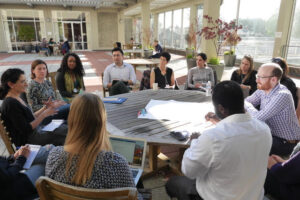Nick Kato (2L) and Prof. Colleen Shanahan recently attended #DebtFreeJustice, a national meeting on juvenile fines and fees. Nick is part of a Justice Lab team working with the Juvenile Law Center on juvenile costs. He shares his impressions below. For more on the meeting and the issues, visit BerkeleyLaw.

In February, I attended a national convening on juvenile fines and fees at Berkeley Law School. Advocates from across the country discussed the disparate impact of court-imposed fines and fees, and how burdensome costs defeat the juvenile justice system’s rehabilitative goals. As part of a nascent but dedicated movement, advocates explored how to build off successful reforms in Philadelphia and California, including Philadelphia’s decision to stop charging parents for the cost of their children’s incarceration.
The convening was especially valuable to me as a student because it provided a glimpse into the decision-making process for various advocacy options, ranging from impact litigation to community organizing and impact litigation. Being a part of the convening left me optimistic that advocates around the country can support each other’s efforts to create a more just and rehabilitative juvenile justice system.

